Hi—phew, it’s been a minute! More posts coming soon, many in drafts.
I recently watched the Hulu show In Vogue: The 90s. I also recently turned 50. Having lived through this era as a teen and young adult, it’s weird to see my youth as a moment of historical interest. somstack captures the vibe of the 90s in her post detailing her escapades with runway shows in the 90s, complete with amazing disposable camera pics! Amy Odell at the Back Row has a thoughtful review of the Hulu series, especially regarding the whitewashing of fashion via Anna Wintour. And Shelcy Joseph distills each episode here. While the documentary itself is fine, nothing earth shattering, the very last lines stood out to me, when Naomi Cambell, Gwenythe Paltrow, Wintour all said a version of: ‘The 90s were fun.’ You can read the ending quotes, here, curtesy of Market Appointment.
Huh, yeah, come to think of it, the 90s were fun. I assumed my fun memories of the 90s are due to the fact that I was young. But the docu-series got me thinking, what if the 90s were more fun, objectively. You had to go out, or at least hang out, physically, with others to be social. We drank and smoked (inside, while drinking!) with abandon. Music was everywhere, concerts big and small were both accessible and affordable. Reading Judith Butler felt like a mind-blowing trip. Is this all a nostalgic trip or were the 90s the last fun decade? Things got pretty dark right after Y2K. Fashion wise, in the 90s I was wearing LOW rise jeans, this one Juicy baby tee with a keyhole neckline, and a burgundy pair of Nine West wedges on repeat. By 2010 I, and the rest of Brooklyn, were cosplaying art teachers in oversized garments made of natural fibers with wooden sole shoes.
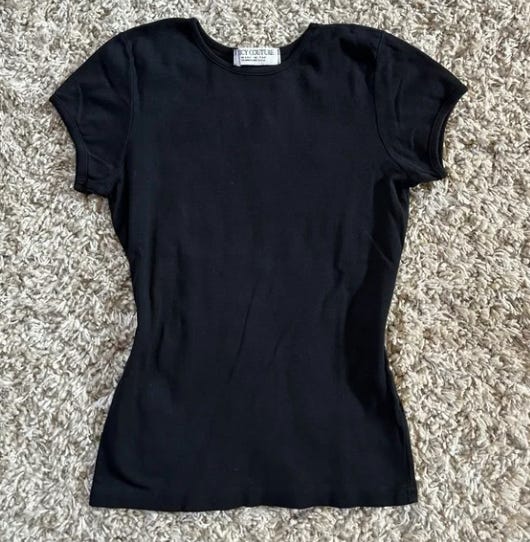
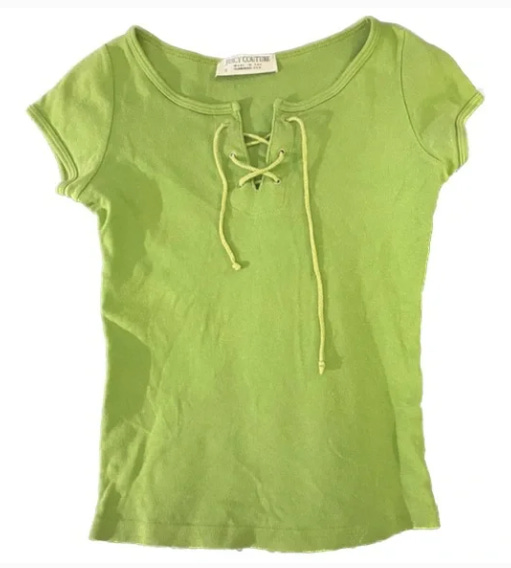
The disappearance of fun reminded me of one of the best Substack posts I’ve read, “Your phone is why you don’t feel sexy” by Catherine Shannon. Her basic thesis: because phones and digital media allow us to look up anything and anyone, at any time, we do not experience the thrills of the unknown, of risk taking. In other words, a certain amount of irrationality is needed to feel sexy. Shannon:
Desire is fueled, to a certain degree, by the possibility of not getting what you want. It depends on a certain distance and difficulty that must be overcome through one’s own effort. Technology makes us lazy.
Our phones and the algorithms running them, have taken the sexiness and the fun out of life. I always cringe a bit with anti-tech rants claiming we’re dumber, antisocial or depressed because of our phones. I mean, look around, it’s not just the phones! But Shannon’s post pinpoints a growing discomfort: nothing has felt as ‘hot’ as the 90s. Again, I assume(d) all this was due to my aging out of using ‘hotness’ as the metric of people, places and things. But, maybe it’s not just me, or my age. Are sexiness and fun really gone?
I’ve been thinking about her post for months, and coupled with all the frustrated posts about the state of Substack/bad vs good writing/excessive affiliate linkers/content vs. writing, I have a rough theory of what’s going on. I think the disappearance of fun/sexiness is because social media has imposed a sort of rationalized (capitalist!) logic on both by turning them into content, which can be endlessly measured, monitored, and controlled. Content has value and value, as any Marxist will tell you, comes from human labor, AKA work. Social media and the worlds its spawns are not fun or sexy because they’ve turned both into tedious forms of work.
Marx enters the chat
I don’t want to turn this into a “back in my day” rant, but the nostalgia for the 90s is interesting because it was the last era without widespread use of personal digital devices and without social media. It’s definitely not great content to explain Marx’s theory of capitalism in one post so I’ll limit this to his idea of “surplus value.” Surplus value refers to the time spent working that generates nothing but value for your boss, the company, the ‘man’, or the capitalist. Surplus value is different from “necessary labor,” which is the amount of work needed to cover your costs of existence. If it takes us 5 hours of work to earn enough wage (ha, we wish!) to buy food, shelter, etc, then the rest of the working day lines the pockets of the company/capitalist. All that we produce, after the necessary labor, is surplus value. The key here is that only human labor produces value, economic or otherwise.
Marx theorized this system of labor and value during the industrial revolution where work was at a factory and sociality (ie, fun) happened elsewhere and off the clock. I’m hardly the first to take his concepts into the digital age. One basic takeaway from digital media studies is that digital media has blurred easy distinctions between on the clock and off. As Sophie Bishop found, social media creates a sense that “you could always be doing more” for pretty much every profession. She calls this expansion of endless work “influencer creep” and even the most highly paid and educated professions are not immune (ask yourself how many dermatologists you follow on social media).
“She’s a Marxist!”
As I sit here and type, I’m doing nothing but creating surplus value for Substack. Digital platforms turn my leisure, pleasure, fun, boredom, community, and aspirations into surplus value. They are built to offload labor on us, and extract as much value from users as possible. Whatever I do online produces value. I don’t even have to actively create content for a platform, my online traces generate surplus value. Once ‘they’ (Google) figured out how to turn all our digital actions into commodities, digital tech has been a money making machine. And, the biggest boon for the platforms is that they don’t even have to pay for necessary labor, ie the labor it takes us to survive. We are all working pro bono for them. Really, all they have to do is present us with a few success stories, Heather Cox Richardson makes millions!, for example, and billions of us will follow suit.
I’m not directly blaming the social media platforms, but I’m also not NOT blaming them. Most of our jobs are bullshit, and not paying us nearly enough, so yeah, why not hop into this expansive digital factory and try our hand. The pull is especially strong for women, youth, and minorities who face lower pay and discrimination in the workplace. Because guess what content does really well? Young women creating ‘sexiness’ or looking like they’re having fun. Once this logic takes hold, our sexiness/fun is valuable, then it’s no longer free from the market. NB: yes, sexiness has always had market value, but the tools to measure and monetize it were more abstract.
The interesting piece of the surplus value equation via digital media is it allows us, content creators, to monetize things that were sort of outside the commodity market. We can turn our gendered forms of labor and knowledge, whether that be fashion appreciation, Marxism, shopping secrets, beauty tips, parenting/mothering practices into economic value. Before digital media, all that gendered stuff was sold to us with no real way for us to make money off of it. So, in a sense, digital media gives us a bit of our surplus labor back to us, as a treat.
This is why I can never get too mad about affiliate links or the various other forms of online ‘selling out.’ Whatever any of us can make, and especially women, from these spaces is a drop in the bucket of the surplus value being made by us. I’m on here, reading all the shopping must-haves and clicking on links like anyone else. When I pay for subscriptions, which I do and will continue to do, I’m happy to support writers. I don’t want to lose sight of the real winner here though, the platforms. Substack is successful not because of some “magic dust” but because of the labor of all the creators, writers, WORKERS do here. Yes, they acknowledge that writing as a profession has been undercut by digital platforms, which have in turn created millions of out-of-work or low paid writers. Substack might be less of the villian, but the model they’ve set up is basically eBay for writing. They provided the tools and factory but it’s still up to the user to figure out how to get paid for their work. And, news to absolutely no one, the inequalities that structure IRL professions occur here as well. As
points out, what do all the top fashion beauty writers have in common? They all “center whiteness and white voices.”Users, us, content creators, writers (call us what you want!), can look to max(x) their own personal surplus value. My day job is in academia but thanks to digital media I can try to extract a bit of profit from my labor, on my own, and off the clock. I can scan myself for opportunities to generate surplus value and in doing so I impose the logic of capitalism on to me, myself and my free time. I can become a commodity! This shift to individuals value maxxing is where fun, spontaneity, sexiness and desire go to die.
Back to the 90s
The nostalgia for the 90s comes out of this exhaustion from the encroaching logic of work via social media. Looking at the instagram account, 90sartschool illustrates how imperfect, yet fun, life looked at the time. Our fun and sexiness, the rationalization of every aspect of life, as a form of content stripes it of its wild and free nature.
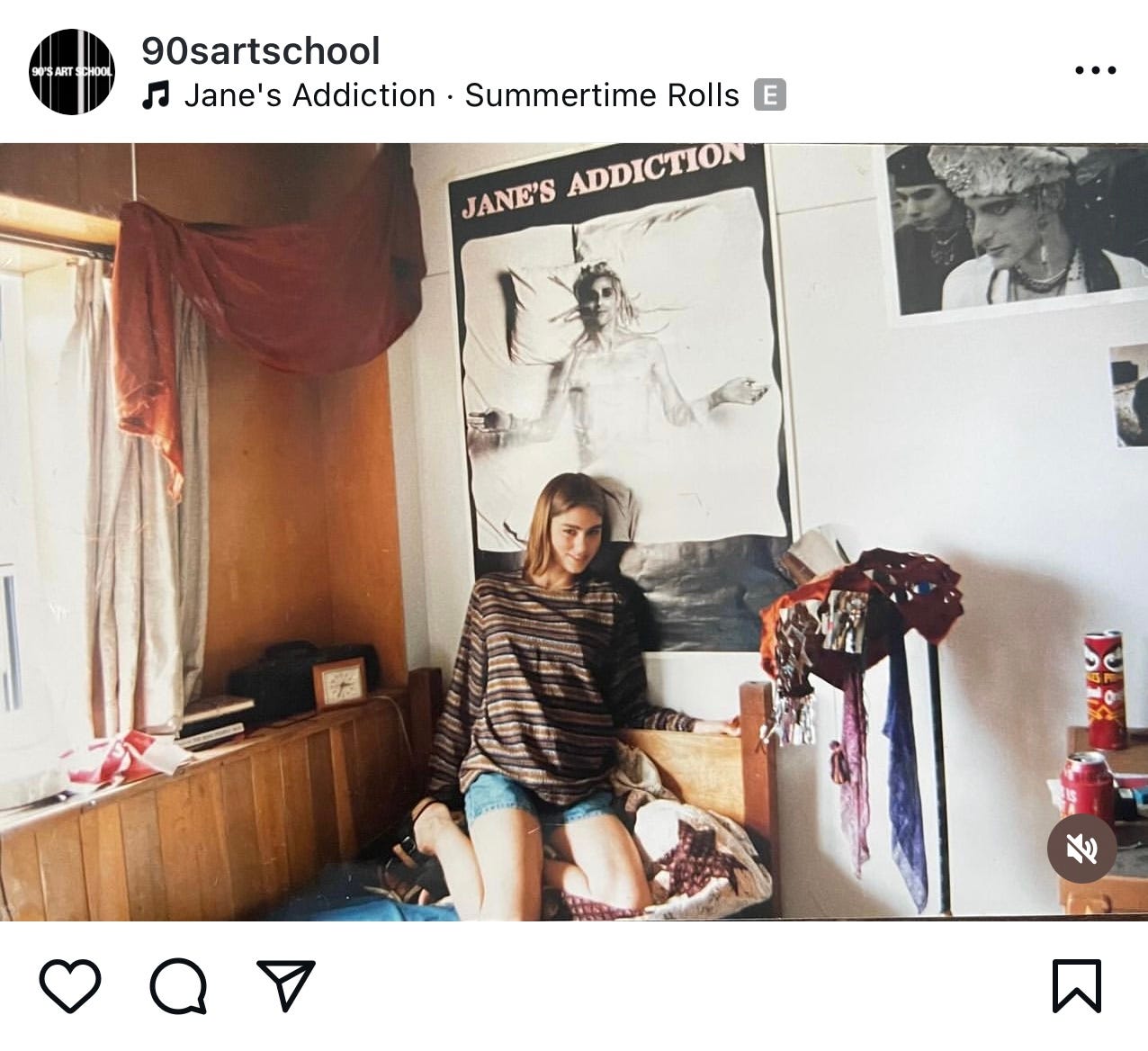
I wonder if this is why earlier this summer I, a 50 year old, was so taken with Charlie XCX content. She and the people around her sure look like they were having 90s era levels of fun. But, as Demarcation points out, partying like that is now reserved for the privileged. The rest of us, as she notes are ‘bed rotting’ in service of big tech:
Being in bed leads to scrolling. Scrolling leads to eyeballs. Eyeballs are profitable. You know how this cycle goes; it leads us down the path to feeling ever lonelier, it leads us to being surrounded by stuff instead of people, it leads us to despair and inaction.
This is by design.
This is a long winded way to say, I don’t have any pictures of the juicy tee shirt because I just lived life in it and did not reflexively think about how to style it, nor take hundreds of photos of it, as I would probably do today. I also did not and could not have bought it in every color (srsly, my FLORE FLORE collection is embarrassing). I did hang on to the Nine West wedges.
Looking back at my 90s days, we definitely had a different type of fun available to us. We did all of our socializing without social media, and, more specifically, without the logic of social media hovering around us. We didn’t share our fun with anyone beyond ourselves. We got dressed up for each other, but any fit or party pics would not be seen for weeks, after we picked up our developed film from a drug store. If we were 20 somethings doing this today, I’m sure we’d turn our hang into content, why wouldn’t we? The algorithms love young women (especially if white and thin) and the potential for gaining hyper-local celebrity status or even free stuff would be a siren song impossible to ignore. We didn’t have social media and looking back, our fun felt ungovernable. It was of little value to the giant corporations. Still, as fun as the 90s were, I know the youth today are having fun in new ways that are probably pretty radical. I want to believe real fun and sexiness will always happen in the spaces outside of market logic. Or, at least I hope!
Yes, Substack is work! But, damn, feels good to be back writing and having this new kind of fun in 2024. More soon.



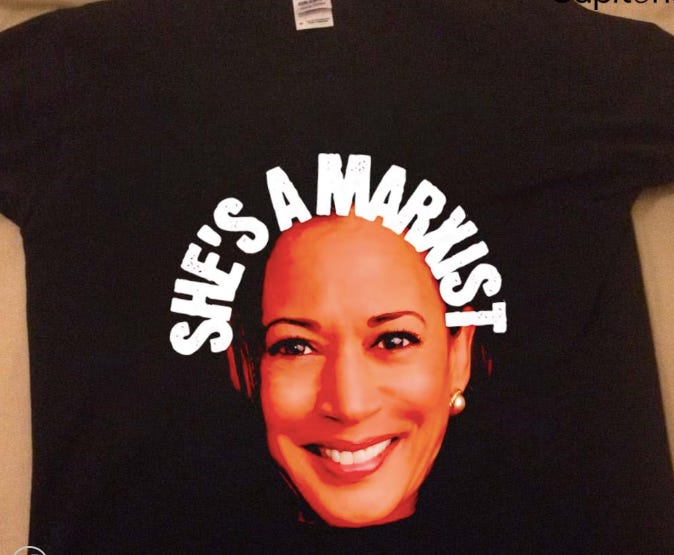
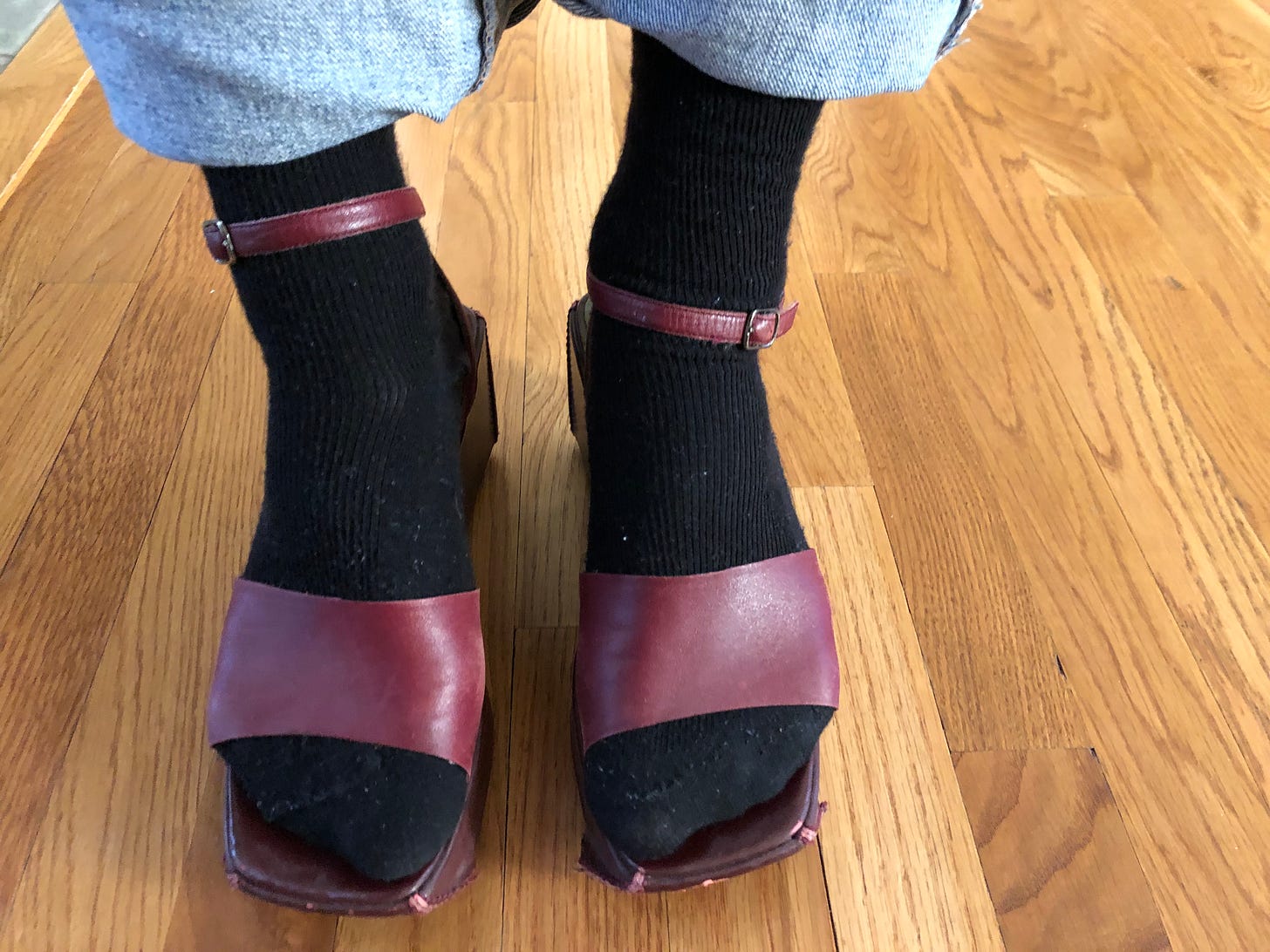
Hard agree with everything you wrote! "Surplus values maxxing" is a feeling I never got when I was noodling on my blog for 10 years, but Substack (and some of its users) sometimes make me feel like I’m not trying hard enough to make this an opportunity (after all, it's not like my actual work pays all that well). But I go back to my old blog sometimes just to remind myself why keeping "value" out of this has its upsides. It makes sense for a lot of people, but it's not for me.
Was literally thinking yesterday how i have such a backlog of newsletters rn and then was like, “but I wish I had a Kara post, I would read that immediately!” 😂 THANK you for breaking down SO well the queasy feeling that social media/making yourself the product ellicits - and also why it’s so hard to step away from!! Substack is the first active social media account I’ve had since “poke wars” were a thing and I still feel new (and therefore HELLA susceptible!) to it after hearing/reading about it for years ¯\_(ツ)_/¯